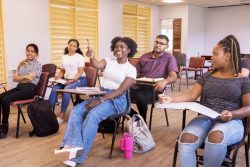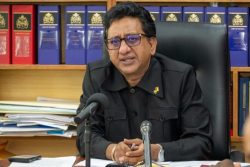When I hear the word “independence,” I think self-determination. It sparks in me a certain pride at the ability to stand on one’s own, build and show the world that you are creator and custodian of your destiny.
We are in the season of Guyana’s Golden Jubilee of Independence and events are in the making in an effort to capture that spirit of a nation free from the hands of the colonialists; a nation proud of its accomplishments since breaking the chains of our once British masters; a nation that can say in 50 years we have fought, overcome and are stronger because of our struggles; a unified nation of six peoples, who focus not on the colour of skin or the texture of hair, but rather the character and integrity of each other; a model nation that can inspire others.
 But is this the case for Guyana? Am I locking myself into an illusion about a Guyana that isn’t? I don’t like to be pessimistic but recently I was faced with the question, “what is there to celebrate?” It was not something I thought about before the question was posed. (After all, which country would let its golden jubilee come around and not celebrate? It’s just not something you do.) The question disturbed me and threw me into a state of questioning what it means to be a Guyanese at this point in our history. I questioned the quality of life I have had, having been born in an Independent Guyana. I was forced to gaze at my reflection and lock eyes with the truth about the hardships faced having lived in this land for 31 out of the 33 years of my existence.
But is this the case for Guyana? Am I locking myself into an illusion about a Guyana that isn’t? I don’t like to be pessimistic but recently I was faced with the question, “what is there to celebrate?” It was not something I thought about before the question was posed. (After all, which country would let its golden jubilee come around and not celebrate? It’s just not something you do.) The question disturbed me and threw me into a state of questioning what it means to be a Guyanese at this point in our history. I questioned the quality of life I have had, having been born in an Independent Guyana. I was forced to gaze at my reflection and lock eyes with the truth about the hardships faced having lived in this land for 31 out of the 33 years of my existence.
All my life I have heard about the good old days. The days when a $300 a month salary could last until next pay day and you still had a little to put away. It baffles me that a penny once had value in Guyana. I was told about the time when we were becoming a self-sufficient nation–producing on a large scale instead of importing–the breadbasket of the Caribbean, a proud nation that was realising its great potential and excelling at all levels.
It seems like a dream or the imagination of those who were aware during that time. But, as with most things in this life, where there is positive there is also negative for light and darkness must exist together to maintain the balance of the universe. I have been told about a time when things were dismal–when certain food items were banned and people felt dissatisfied. I have been told about the lines to collect parcels of food and the uncertainties of what the future held. I have been told about dictatorship and the rush to migrate for ‘a better life.’ Some of our most gifted, our scholars, went to North America, Europe or the Caribbean islands instead of staying to fight and develop our land. Did the actions of those who left help to break our nation? Could we have been greater had more of the best and brightest stayed?
In my experience, there has always been that idea of migrating to ‘greener pastures.’ As a little girl, I dreamed about the day I would be driven to the Cheddi Jagan International Airport, put on a plane and flown to the great USA. Leaving Guyana, meant progress. Many of those who would have left and returned on holidays sold us the idea that somehow North America or Europe was paradise. And so, like many, I dreamed about when my turn would come to leave.
While I dreamed, I lived in a Guyana where politics divided us. I was pulled into the muddle, where it was us against them. In my lifetime, folks went from making hundreds of dollars to thousands and still not making ends meet. I saw the further breakdown of a society already damaged by mistakes of some of our ancestors. I saw the rise in crime. I saw the senseless killings of young men. I saw politicians trample on the heart and soul of our nation. I saw the effort to destroy communities once held in high esteem. I saw our art stifled, our education system disintegrating and many turning their backs on this country ever advancing.
But despite all that, there were the good things: those who never gave up; those who stayed and fought for this nation; those who made loud the voices of the ordinary man in the face of anguish; those who put their hearts and souls into the business of building this nation; and even those who pushed to keep the arts alive. There was also the freedom to enjoy childhood and the freedom to enjoy the natural beauty of this land. And there was a time when festivals, such as Mashramani, made us smile with pride.
So what can we celebrate after 50 years? And who will celebrate? Am I going to celebrate my frustrations as an artist? As someone who feels angry at the way our culture is dying? As someone who longs to see the establishment of institutions that will nurture, respectfully compensate and celebrate our artists? Will the citizens who are struggling from day to day to make ends meet celebrate? Will those who are homeless celebrate? Will those who are experiencing depression and other mental health issues and not getting the necessary help needed celebrate? Will those waiting on justice for crimes committed against them or their relatives celebrate? Or will it just be ceremonies for a few?
I say we can celebrate the fact that we fought for and won our independence and the fact that within the last 50 years we also became a Republic. We can celebrate our diversity—the fact that we take part in each other’s cultures, enjoy each other’s foods and support each other’s businesses. We can celebrate the great leaders we have had and all our great men and women who have made their mark all over the world. We can celebrate the hope for a future where we, as Guyanese, can all enjoy the good life, where we will be ahead in terms of economics, education and technology, where all men, women and children can be proud to call Guyana their home.
It is not just the job of any government to see this happen. We, the people, hold the power. We must use our power. We need to see pass being a supporter of one political party or the other. We need to see each other first as human beings and embrace our oneness as Guyanese. We need to stand together and hold our politicians to their word for real change will never come if we turn a blind eye to their errors. Individually, we must each make a decision to do our part and 50 years from now, when we celebrate our Independence Centennial, Guyana may very well be that paradise.
Mosa Mathifa Telford is a playwright and a writer for the radio serial drama Merundoi. She won the Guyana Prize for Best Drama in 2013 for her play, ‘Sauda.’









